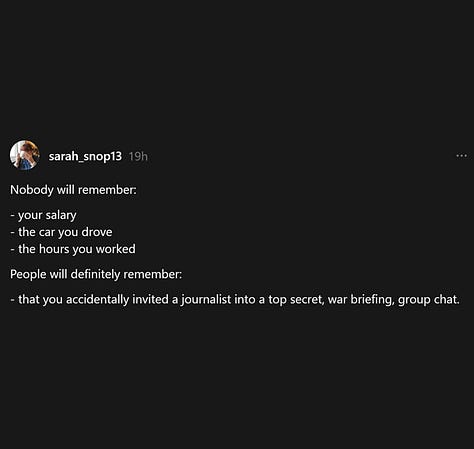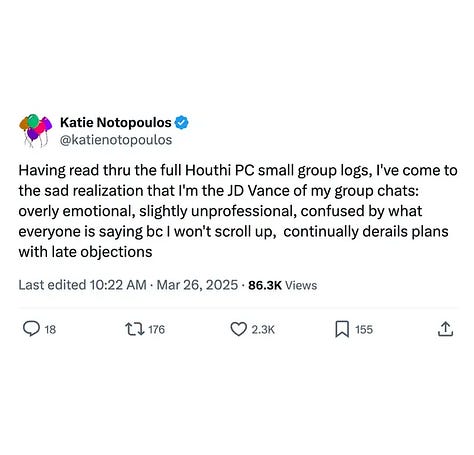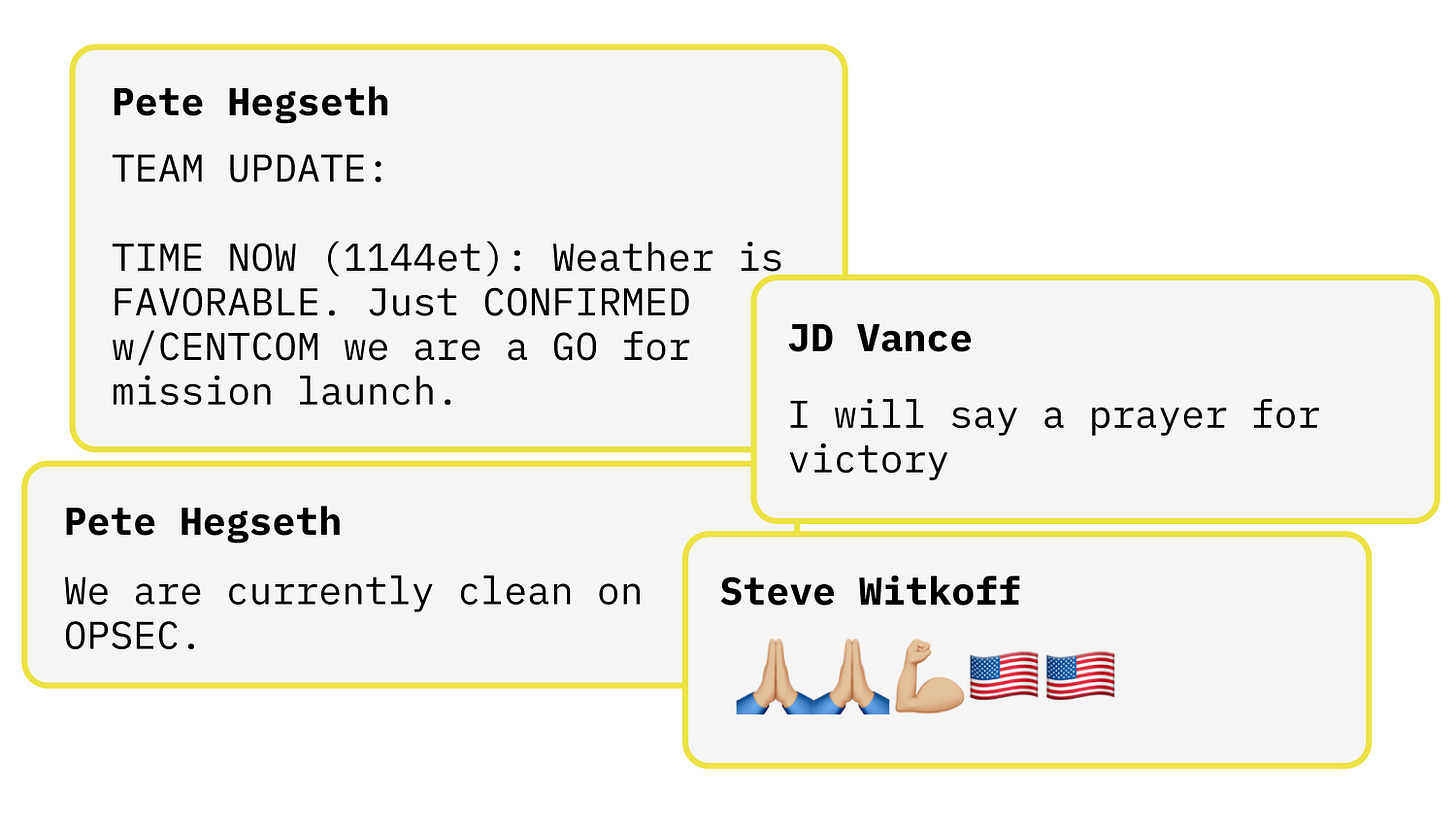Unvirtue Signalling (a chatastrophe)
Issue 21: Break glass in case of emergency
Let’s be real: this is a comms scandal everyone’s already heard about. It’s the talk of the town. Literally. Two finance bros walking behind us in Martin Place yesterday were really chopping it up.
We’re not publishing this emergency issue to tell you what happened, as you know the beats. A Signal group chat. A misplaced invite. The Atlantic’s Jeffrey Goldberg, suddenly looped into military chatter. He sat quietly. Took notes. Watched it play out. And when the story was inevitably downplayed by all involved? He published the whole thing.
There’s already been a lot of noise, but those who have followed COMMPRESS long enough know that in our pursuit of defining what sparks a smarter conversation, we really do love breaking down a dumb conversation.
More specifically, we’re here to point out some of the less obvious implications of what the hell this little fandangle says. About power. About platforms. About crisis mismanagement. About the way people cosplay as commandos with Signal user names and bicep emojis. We’re also here to have a general laugh… while we quietly redirect some funds to building a D-Day bunker outside Coober Pedy.
Welcome to the Emergency Issue.
Act
It’s not a smart conversation if there’s nothing to talk about.
Start with the right strategy and execution to prove you can walk the talk.
An exercise in making your own bed
Here’s the thing about credibility: you can’t fake it and you certainly can’t emoji it into existence no matter how much 💪 you use. When senior members of the Trump-aligned US administration used Signal to coordinate military strikes on Yemen, it wasn’t just a logistical choice – it was a rhetorical disaster. These are the same figures who once made Hillary Clinton’s emails a rallying cry. “Lock her up” wasn’t just a chant, it was a worldview. So when they themselves turn to encrypted messaging apps for official business, the hypocrisy practically writes itself.
It goes deeper than just app choice. The nature of the platform feeds the culture. Signal is built for secrecy. For whisper networks. For the illusion of invisibility. And that illusion creates space for performative power. It’s hard not to read the entire exchange – which The Atlantic published in full after the officials insisted the messages were “unclassified” – as LARPing. You’ve got former Fox News anchors using military slang, emojis being dropped like status updates, and real-time reactions to violence dressed up in gym-rat GIF logic.
The government has always run on communication platforms. But this specific use of Signal, given its symbolic baggage and the cultural signalling it carries, tells us a lot more than it thinks it does. It says these people don’t just see themselves as part of a government, but as participants in a closed club – a parallel administration that plays by its own rules.
Michael Wolff, whose access to Trump’s world is almost as surreal as the world itself, said it plainly: “None of these people really think of themselves as government employees. They think of themselves as Trumpers. That’s a parallel world.”
In that world, the role of the government is cosplay. The messaging app is a costume. And accountability is an optional accessory.
The point here is that internal comms channels reflect external brand values. If you’re using a tool that contradicts your stated values, it won’t take long for that contradiction to come to light. And if you’re adopting the tone of a teenage Discord mod while running international military strategy, don’t expect the public to read that as strength. They will read it for what it is: a mess.
All of this is to say: if you say something in public, you better stick by it – or have a damn good reason for doing the exact opposite. Trump’s camp didn’t have to drag Signal through the mud, just like they didn’t have to use it for military planning. But by doing both, they’ve taken a garden-variety gaffe and turned it into a group chat-shaped grenade.
Explain
The way those big ideas are distilled into words that resonate, build brand identity and nail the message.
Crisis? What Crisis? Good Supertramp album. Bad strategy.
When The Atlantic broke the story about the Signal debacle, it inadvertently created a classic case study in how to not handle a crisis. Think what you will about Donald Trump and his administration, most of the time he and they are masters at communication. Not this time. Not by a long shot.
No one took ownership. There was no coordinated response. There was no single voice. There were a lot of mixed messages and confusion (perhaps deliberately?). The person ultimately in charge dismissed the issue, ridiculed the media outlet that broke the story and defended his people, that is, defended the indefensible.
Rather than acknowledging the mistake, Trump and his people took the path of deflection and minimisation. “It was unclassified”, they shrugged, as if that made it less of a national security story and more of a casual office mis-step. But the media doesn’t work like that, and journalists certainly don’t respond well to bluffing – particularly not when one of their own has irrefutable proof that the story is correct.
When Trump was first quizzed about the scandal, his response was classic Trump: “I’m not a big fan of The Atlantic. To me it’s a magazine that’s going out of business … but I know nothing about it.” Nothing surprising in that, or his later assertion that very few people read The Atlantic (its total circulation in the second half of 2024 grew 15% to 1.2 million, making it the 20th biggest magazine in the US). This is a person who lies as easily as he breathes in and out.
Jeffrey Goldberg waited. He read. He listened. He watched the bizarre responses from Team Trump unfold. And when the downplaying became the party line, he published the whole conversation (presumably with an army of lawyers by his side). After all, if it’s not classified what’s the big deal in sharing?
The inclusion of a journalist in a Signal chat was a massive blunder, as was the scattered, unstrategic response that followed. Eight people issuing slightly different statements to different outlets doesn’t equal a response strategy. It equals chaos and breathes more oxygen into the fire than one single, cogent statement ever could. The public didn’t see unity or control; they saw half-based damage control spiralling into god knows what.
The tone of the Signal chat – emoji-filled affirmations of bombing targets, complete with fire, bicep and American flag symbols – only fuelled the debacle. It felt like watching someone react to a successful gym set, not a coordinated military operation. You can say the messages were unclassified, but don’t expect anyone to read “good job 💪🔥🇺🇸” and come away with a sense of thoughtful leadership.
The crisis comms playbook here isn’t hard, or new:
1. Respond early and own, likely, really own the issue.
2. Never bluff, lie or obfuscate. Be honest. If you can’t be totally honest because of security or regulatory issues, say that.
3. Speak with one voice. Yes, have a small team managing the crisis and the comms, but go out into the world with one voice.
4. Don’t antagonise stakeholders, including the media.
This unfolding story is a case study in how bad crisis comms can deepen a crisis. It’s also a clear reminder that the way you respond to mistakes matters just as much as the mistake itself. Maybe even more. Oh yeah, and never underestimate a journalist’s capacity to call your bluff in public.
Amplify
It’s not a conversation if no one’s listening. Cleverly amplifying the message to the right audience, at the right time, is the final piece of the puzzle.
Signals that you’re no longer at the cool party
Time for a – likely welcome – reprieve from the immediate issue of American idiots on mobile devices. Let’s move away from users and talk for a second about platforms themselves.
On Tuesday we heard from Senior Vice President of Global Insights at Universal Music Group, Gabi Lopes, at ARIA Innovator. Among many things, Gabi outlined a very real, very current shift in where digital influence is happening… as demonstrated by this aesthetically pleasing, high-resolution mobile phone image:
The point? For most brands, increasing presence in the discussion space is still a huge opportunity.
We’re in the era of conversation, not content, and that conversation isn’t happening in tweets or TikTok comments. It’s happening in group chats, DMs, Discord servers, WhatsApp Communities and, yes, even Signal.
What was once a niche tool for the privacy-obsessed is now quietly powering everything from underground fandom movements to high-stakes brand advocacy. Signal isn’t the outlier anymore. It’s the blueprint.
Platforms like Discord (150 million-plus monthly active users), WhatsApp Communities, and Signal are becoming the digital equivalents of private members clubs where users choose who they let in, and where brands must tread carefully, if at all. These aren’t just messaging tools; they’re high-trust environments where influence is built through intimacy, not reach.
There is, however, a catch: the privacy that powers them is also what makes them volatile.
When people believe they’re speaking in private, they speak more freely. That’s powerful, but when that privacy collapses (as we saw in the recent Signal image-leak controversy), there’s no media-trained statement that can contain the fallout.
Brands have spent years mastering the performance of authenticity in public. But these spaces don’t respond to performance; they respond to consistency, transparency and relevance.
These are now the places where loyalty is forged and where reputations can unravel faster than a media release can be drafted. For marketers, this isn’t just another channel to bolt onto a strategy. It’s a shift in paradigm.
Public feeds are losing traction; influence is moving underground.
The challenge? You can’t observe these spaces the same way you monitor social. There’s no universal analytics dashboard for WhatsApp or Discord. No “engagement rate” on Signal. It demands a new kind of listening: participatory, empathetic, contextual.
So, no, these platforms aren’t invisible. They’re just quiet…
Until they’re very, very loud.
Picks & Recs
Presenting: our favourite memes from the fallout.
Yes, this situation is bleak. But the internet will always do what the internet does best.












